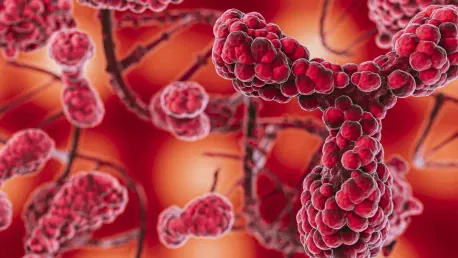The ongoing search for better and safer treatments for multiple myeloma, a type of blood cancer, has taken a significant step forward with the development of a new cell therapy by Arcellx and Gilead Sciences. The pioneering approach demonstrated a substantial reduction or total eradication of cancer signs in 95% of trial participants who had previously seen disease progression despite undergoing other treatments. This promising statistic stands out especially when compared to Johnson & Johnson and Legend Biotech’s established therapy, Carvykti. Such advancements hint at the potential evolution of multiple myeloma treatments, indicating that patients might soon have a highly effective alternative with potentially fewer side effects.
A Safer Therapy Option
One of the most compelling aspects of the new therapy is its enhanced safety profile. Notably, none of the volunteers in the trials exhibited movement disorders, such as parkinsonism, which is a concerning side effect linked to nerve damage observed with Carvykti. Such complications have plagued existing treatments, making this aspect of Arcellx and Gilead’s therapy particularly appealing to both patients and healthcare providers. The data shedding light on these findings was previewed in an abstract for an anticipated presentation at the American Society of Hematology’s annual meeting. Additionally, results from a small Phase 1 trial involving patients with earlier-stage multiple myeloma have been included in this promising data set.
CAR-T therapies like Carvykti work by targeting the BCMA protein on multiple myeloma cells. This method has set a benchmark, getting approval for use even after just one line of therapy. Despite their effectiveness, CAR-T therapies, such as Carvykti and Abecma (developed by Bristol Myers Squibb and 2Seventy bio), come with substantial challenges. These include complicated manufacturing processes, the need for preparatory treatments, and a range of immune-related side effects. For example, in Carvykti’s trials, parkinsonism was noted in eight out of 285 participants. However, Arcellx and Gilead’s anitocabtagene autoleucel (anito-cel), tested in two distinct trials, managed to avoid such serious side effects, marking it as a potentially safer therapy option.
Mixed Reactions from Analysts
Despite the promising results, Wall Street analysts have displayed mixed reactions to the news. On the one hand, Stifel analyst Benjamin Burnett acknowledged the therapy’s favorable efficacy and safety profile. However, he pointed out a critical issue: a participant’s death due to hemorrhage during the trials. It raises valid safety concerns that may need addressing before wider acceptance of the treatment. Conversely, RBC Capital Markets analyst Leonid Timashev underscored Carvykti’s superior efficacy. He suggested that due to its higher overall response rate and greater complete response rate, Carvykti might retain its status as the preferred treatment option for multiple myeloma despite its associated risks.
Arcellx’s and Gilead’s therapy achieved a 95% response rate, with 60% of participants experiencing complete or near-complete elimination of cancer, which is noteworthy, especially without the occurrence of parkinsonism. However, Carvykti’s data shows a slightly higher overall response rate at 98% and an 80% complete response rate, though with significant side effects. The mixed analysis reflects the complexity of weighing efficacy against safety, and the ultimate verdict from the medical community and stock market remains uncertain.
Future Perspectives
The pursuit of safer and more effective treatments for multiple myeloma, a type of blood cancer, has made a notable advancement with a new cell therapy developed by Arcellx and Gilead Sciences. This groundbreaking treatment showed a remarkable ability to significantly reduce or completely eradicate cancer symptoms in 95% of trial participants who had previously experienced disease progression despite other treatments. This impressive statistic is especially noteworthy when compared to Johnson & Johnson and Legend Biotech’s well-established therapy, Carvykti. The development of this new therapy by Arcellx and Gilead suggests an exciting potential shift in multiple myeloma treatments, offering patients a promising alternative that could come with fewer side effects. The success of this new approach marks a significant milestone in the ongoing quest to improve outcomes for those battling this challenging cancer, providing hope that more innovative and effective therapies are on the horizon.









